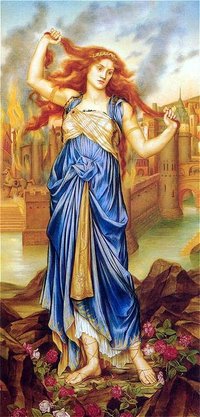Cassandra
|
|

In Greek mythology, Cassandra ("she who entangles men") (also known as Alexandra) was a daughter of King Priam of Troy and his queen Hecuba, who captured the eye of Apollo and so was given the ability to see the future. However, when she did not return his love, he placed a curse on her so that no one would ever believe her predictions. Thus Cassandra foresees the destruction of Troy (she warns the Trojans about the Trojan Horse, the death of Agamemnon, and her own demise), but is unable to do anything about them. Coroebus and Othronus came to the aid of Troy out of love for Cassandra.
After the Trojan War and after being raped by Ajax, Cassandra is taken as a concubine and sex slave by King Agamemnon of Mycenae. Unbeknownst to Agamemnon, while he was away at war, his wife, Clytemnestra, had begun an affair with Aegisthus. Upon Agamemnon and Cassandra's arrival in Mycenae, Clytemnestra asked her husband to walk across a purple carpet; he initially refused then gave in and entered, not believing Cassandra's warnings. Clytemnestra and Aegisthus then murdered Agamemnon, and then Cassandra. Some information says that Cassandra and Agamemnon have twin boys Teledamus and Pelops, who are killed by Aegisthus.
Homer. Iliad XXIV, 697-706; Homer. Odyssey XI, 405-434; Aeschylus. Agamemnon; Euripides. Trojan Women; Euripides. Electra; Apollodorus. Bibliotheke III, xii, 5; Apollodorus. Epitome V, 17-22; VI, 23; Virgil. Aeneid II, 246-49.
In more modern literature, Cassandra has served as a very popular subject for tragedy and romance.de:Kassandra (Mythologie) es:Casandra eo:Kasandra fr:Cassandre (mythologie) it:Cassandra (mitologia) nl:Cassandra ja:カッサンドラ pt:Cassandra sv:Kassandra
